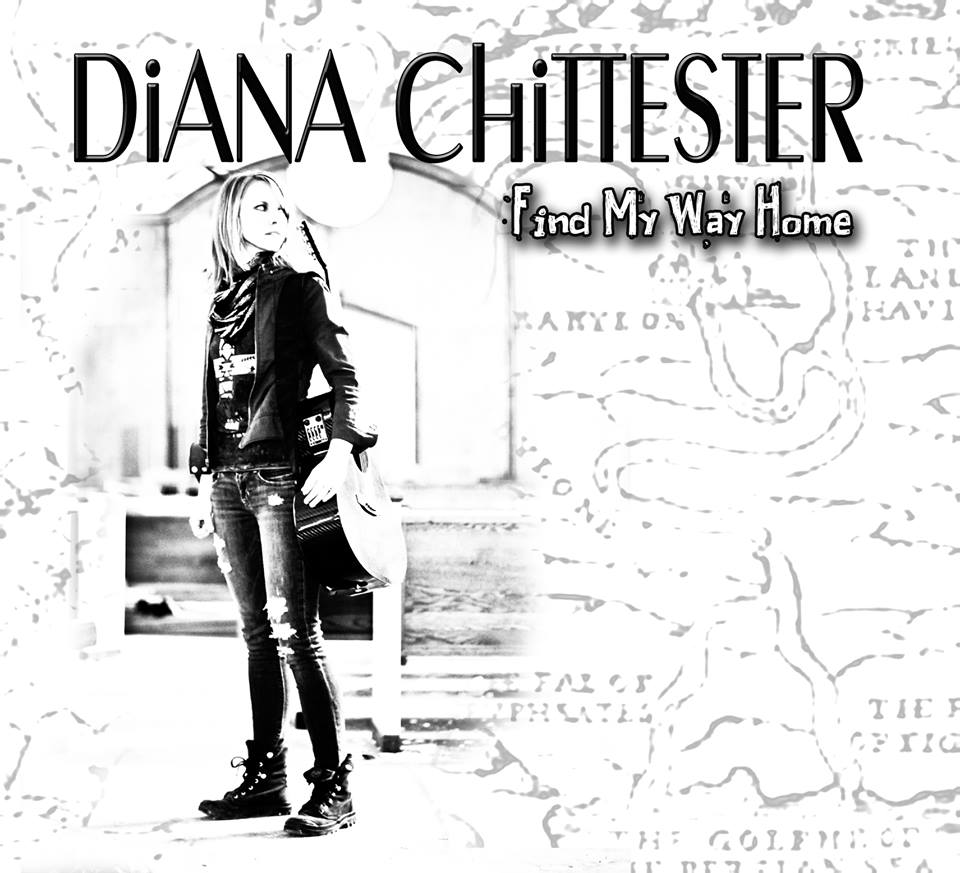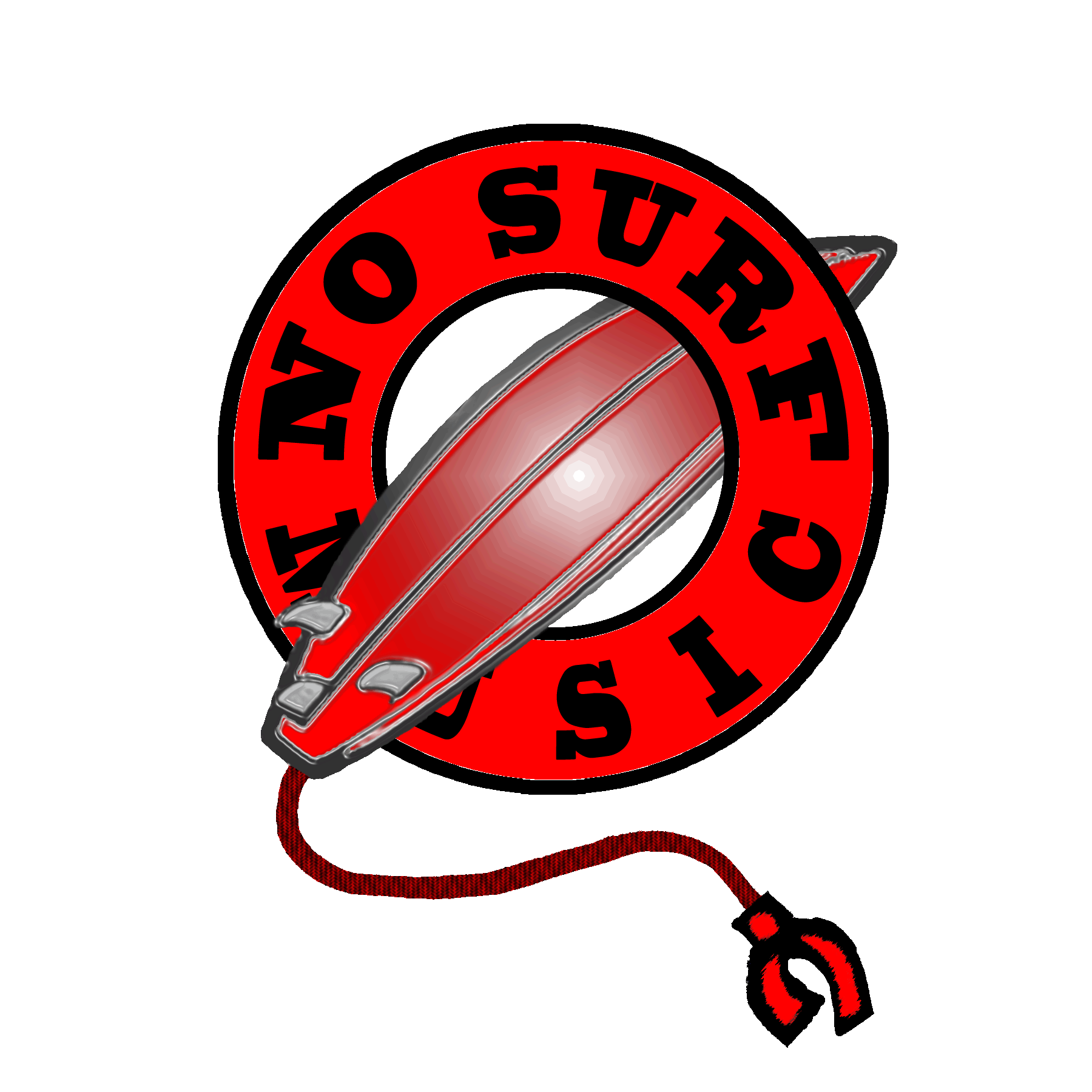
The Lowdown:
September 2, 2014
September 2014 Featured Review
Diana Chittester: Find My Way Home
by Jason D. 'Diesel' Hamad
Diana Chittester is a progressive folk singer/songwriter with a powerful, unique guitar style & a sharp, clear voice that demands to be heard. Here, she performs at the cd release show for Find My Way Home, an album that details her personal struggle for self-acceptance and understanding while remaining universally relatable. Photo by Jason D. 'Diesel' Hamad, No Surf Music.
I often say that art is one of the best ways to measure the success of a civilization, specifically because it is so impractical. The Grapes of Wrath never fed anyone, the Mona Lisa never clothed anyone, and aside from providing a little bit of shade, David is a wholly inappropriate means of shelter. Nevertheless, since the dawn of our species we have devoted our resources to artistic endeavors. The greater the portion of our society committed to such undertakings—the greater the part that eschews the practicality of growing and hunting and spinning and weaving and sawing and hammering in favor of creating something far more ethereal—the more productive must be those who provide for our needs, and the greater our richness as a people.
Art is how we examine ourselves both as individuals and as a society, how we convey our most important of thoughts, how we share emotions untransmittable through more mundane means. It reflects our reality, but projects our aspirations. The world is a different place without Guernica, without Catch-22, without Mad Men; without The Columbia River Collection, a poorer, less connected, less introspective environment reduced to mere nature, red in tooth and claw. It is these objects of art that raise the human condition beyond the moment-to-moment questions of base survival and give life greater meaning. Diana Chittester’s new album Find My Way Home is just such a work.
Chittester is a slight, quiet woman just on the waning edge of her third decade, not unfriendly but reserved and more apt to hide at the margins of a conversation than to command it. Yet when she dons her armor of torn jeans and scarf and raises her chosen weapon, an almost mystical transformation occurs. Diana is a huntress, a lioness, a force of nature; as gifted a storyteller and personal confessor as she is a goddess of the guitar. She becomes a warrior, willing to sacrifice her body and soul upon the spotlit battlefield if only it will lead her listener to some semblance of truth, some greater understanding.
Chittester’s music is enthralling thanks to an intense, unique guitar style in which she simultaneously strums rhythm and picks the melody. Her previous recordings were full-band efforts that utterly failed to capture her essence. After all, for a woman who can make a single guitar sound like an orchestra, extra musicians are just dead weight. Recorded solo, acoustic and live to tape in just three days, Find My Way Home perfectly captures the magic of her live performance. It sounds exactly as it should, from the most halcyonic lull to the most harrowing crescendo.
Lyrically, Find My Way Home is foremost the artist’s personal struggle for self-acceptance and understanding, but it is precisely its specificity that yields its universality. Although a particular set of circumstances molded her life and the journey that the album describes, at its heart it is about alienation and overcoming its specter, an anthem for the outsider sung by a paladin-balladeer crusading against the very concept of “the other.” She possesses strong convictions and does not deny that right to her fellow travelers, but, as she puts it, “choosing a religion or a belief over a human being is just something that I cannot wrap my head around.”
Here, Chittester—clad in her denim armor and clutching the weapon with which she slays her holy demons—casts herself in the role of paladin-balladeer fighting the injustice she's experienced in an effort to eradicate it for those who follow her. Photo by Elaine Manusakis, Every Angle Photography.
The daughter of a minister, Chittester found herself an exile in her own land when she declared herself to be a homosexual, an abomination to the life she had hitherto known. Cut off by her family and set adrift in an unfamiliar world, she was forced to build a new life from the ground up. Washing ashore in Cleveland, she began to forge new connections as she pursued the craft of a singer/songwriter. Still, the demons of her past nipped at her back. It was when she wrote the album’s title track that the conflict between new life and old became apparent.
“I realized I felt disconnected from my past but also lost without it,” she explains. “The biggest line of the song is ‘where I’ll be if I ever make it home,’ which brought to my attention that even if I did reconnect with my past, I didn’t know how it would fit into my current life. Being able to acknowledge that I had that inner issue made it possible to start talking about things that led to that disconnect in the first place.”
Though organized neither in chronological nor thematic order, the bulk of the album’s tracks trace the path of this wayfaring through three distinct phases that I describe as the Denial, the Passion, and the Resurrection. The first represents Chittester’s ostracism from her family and the anger, frustration and sense of loss this engendered, and includes the tracks “Cold Man,” “UnЯeal,” and “Everything You Are.” The middle chapter describes her odyssey through the wilderness and towards the promised land of acceptance and is typified by “Alleluia,” “Storyteller,” and the titular “Find My Way Home.” The dénouement, embodied in Chittester’s personal anthem “Doin’ Fine,” describes the exultancy of finally reaching a place without fear from which the next journey can begin.
From the first ringing chord of the leadoff track, “Cold Man,” Chittester’s vitriol is so evident that it’s palpable. Littered with religious symbols, the song pulls no punches as she tears into the Bronze Age belief system that would lead a man to deny the humanity of his own offspring in a campaign to send “sin-sick souls” such as hers “to the depths of hell to burn.” After refusing to repudiate her own identity in order to buy her way into his version of salvation, the offending limb is cut off and she is cast out from his kingdom:
Now that the fire and brimstone have cleared
And I am left with the choice of a faith or a fear,
You had turned from me, yeah, to seek out your divine
And I’m just the pillar of salt that you left behind.
Oh you’re a cold man
Seeking warmth from the light
And I’m a woman on the war against right.
I challenged your dynasty to reveal Himself and show faith to me.
It’s too much time gone now…
It’s too much time…
It’s too much time just to give it up.
With Chittester’s clear, powerful voice backed by her potent guitar, the song is an unrelenting assault showing the depth of her warrior persona. This stands in contrast to the tortured seeker typified by the collection’s best song, “Alleluia.” Written in the silent reflection of a songwriters’ retreat, it recounts a sojourn back to her former home, her trumpet’s call tearing down walls not to slay or pillage but to reach reconciliation with those within. The “alleluia” chorus represents her own redemption—not praise for a deity, but for her own realization as a person and the sense of peace it allows her to attain:
I’ve reached the cabin in the woods now,
Oh, the one between the trees and shadows.
I can’t get through those locked doors or windows
Cutting off the life that lives inside
So I’m heading back those pathways,
Oh, the ones that took me far and distant.
I’m hoping that this call for truth will lead me on,
‘Cuz that’s the way I’m moving in.
Alleluia!
“‘Cold Man’ is more of the anger surrounding the issue,” she explains. “There’s attitude and angst. The dove being sent to me was not just a peace offering, but also was used to acknowledge the religious symbol, so by accepting the dove I am also accepting the religion. Sending it back painted ‘black as [they] painted me’ is a way of saying that I am not looking for forgiveness or to change in order to be accepted, but I am who I am and that is what needs to be accepted.
Chittester at her most sublime seems to embody the peace she finds through her personal struggles and relating them in her lyrics. Photo by Jason D. ‘Diesel’ Hamad, No Surf Music.
“‘Alleluia’ is when I came to terms with our differences. I realized that if I didn’t want to be changed, I couldn't expect someone else to change. So the significant line is ‘by lowering these expectations I’m taken back.’ That is the peace offering on both sides: I am accepting you and not asking you to be different from who you are, so that is where we can find peace and I am taken back into the family.
“Being that religion was the reason for our separation, I used words like ‘salvation’ to tie in the idea of a ‘religious experience' because the acceptance I felt I grew for them was the closest I could come to a religious awakening.”
It’s this transition in thinking that marks the divide between the Denial and Passion phases of her arc. By the time “Alleluia” is written, she’s put the anger behind her and built a life for herself in which she’s supported and with which she’s satisfied, though haunted still by past conflicts and the deep loss she feels. The end of the song—where she finally moves on—signifies the metamorphosis of the Resurrection, the final redemption and acceptance of herself and the ability to begin the real course of her life.
No better revelry for this could exist than “Doin’ Fine,” which—though it appears early in the collection—is really the culmination of the long pilgrimage into her own soul. Brighter than much of the rest of the album, the song details her early years sequestered in the relative peace of small towns and behind her family’s fortifications, fearful of the multitudinous monsters that lay in wait just beyond the gates in “that wondrous great unknown”:
Well, I was born, oh, a princess to a king and a queen.
They kept me locked up in their castle so that I couldn’t see
All those dragons breathing fire around me,
Till one day a knight came with the beast that he slain
On his horse with his sword and suddenly I became
Just as safe as I was inside.
So I’d lie at night wide awake and image me strong,
Braver than the bravest of the knights out at war.
If I could grow wings I’d fly.
And I’m doin’ fine,
Oh, in this undefined!
I’m taking that madness
And making it magic
And claiming it mine!
Yes, I’m doin’ fine.
Though these three songs best trace the transition embodied in the collection, they are far from the only high-quality tracks on the album. Several songs sit outside this narrative, including “Take It Back.” Chittester describes this piece as a “crazy love song,” but more accurately it details the irrepressible sense of loss experienced at the exact moment of a relationship’s dissolution. Featuring some of her most distinctive guitar work, it begins with a series of slow, gingerly picked notes before picking exploding into powerful strums underpinning her scorned pleas.
The airy “Storyteller,” written as a companion to Elizabeth Earley’s novel A Map of Everything, describes the relationship between two sisters from the perspective of the younger, who lives vicariously through the stories of her more confident, more experienced sibling and learns to navigate her own life through the lessons they teach. When this resource is suddenly denied her, she is forced to make her own way despite her fears:
So baby please, will you please
Come on back to me?
I’m waiting now just to see
If I can do this out on my own.
Storyteller, don’t let your stories be gone.
These lamentations are enough to break even the hardest heart, but eventually the narrator finds the strength to meet life’s challenges without a pathfinder. While Earley’s sister’s counsel was lost due to an accident, Chittester found parallels with the relationship to her own older sister, lost to her because of the rift within her family.
On the subject of that schism, “Everything You Are,” written well before the album itself was conceived, is an even more powerful indictment of her family’s closed-minded refusal to accept her than is the leadoff track. With lighter strums and cooler vocal delivery, it creeps up on its prey rather than pounding it into submission, making its cuts all the more deadly. Once again Chittester turns religious symbolism against those who preach hatred:
As a power has descended down
On a house, oh, I used to call my home.
And I’m looking back there
At all these stones as they’re thrown,
And seeing that the stones in the hands
Of the family that I know.
So I will pray that someday you’ll learn
Everything you are
Isn’t all that’s real.
You’re so badly lost.
Everything you learned, no,
You’ll see someday you’re wrong.
You’ll see it someday. You’ll see it, oh.
Chittester describes the psychosexual thriller “UnЯeal” as a song about seduction, but it’s really about surrender. Chronologically, it should be placed at the beginning of the collection, as Diana forsakes the prohibitions of her crumbling morality and submits to the pleasures of the (female) flesh. Her voice embodies equal parts passion and strife as she finally submits to that for which she so desperately lusts:
So drink me in.
Swallow me down.
I need to be further than your skin.
I’m going nowhere now.
I’m desperately bound
To this wicked you live.
And oooh what it feels like
Is unreal.
And oooh what it feels like
Is unreal.
Hell, I’m fully aware that Diana ain’t interested in the equipment I’m packing, and I still can’t help but melt into a puddle at her feet. Without trivializing it too much, this undoubtedly unthrones Lydia Loveless as the queen of the cunnilingus ballad.
In the powerful “Breathe Without Air,” Chittester transforms into an Earth Mother figure metaphorically chastising her children for the foolish belief that they can survive outside her loving embrace.
Ironically, if this collection ended after eight tracks, it would almost certainly have scored a perfect ten, so powerful are Chittester’s lyrics and her musical prowess. Complaints could be lodged that the album is too indignant, too confined to a small spectrum of topics, and too musically homogenous. I’ve heard them all and I reject them. This is not a bitter album. Impassioned, yes, but the narrative is about freeing oneself of such acerbic emotions, something that cannot be accomplished without first relating them, which Chittester does with incredible intensity. A journey that ends with “Doin’ Fine” is a triumph, not a tragedy. While this is not a concept album, it was meant to relate a specific story, and so the fact that a number of themes are repeated is natural and the relatively narrow breadth of topics forgivable. And while I have no doubt that Chittester will expand upon her unique musical style as her career progresses, she creates an astoundingly variant array of sound with no more than six stings and vocal chords.
Chittester's guitar work may be her trademark, but much like her heroine Ani DiFranco—in whose Babeville venue The 9th Ward this photo was taken—it is the power of her words that truly demands attention. Given her talent, there's little doubt she'll get it.
The only criticism that holds up is that the album fades both sonically and lyrically with the final two tracks. “Find My Way Home,” though it provides the thematic underpinning of the album, is solid, but not as compelling as its predecessors. It’s the final track, “Astonished,” that simply fails. While it does contain a couple lyrical gems, tells a compelling (if rather obtuse) story and fits well with the album’s theme of finding value in temporal connections rather than some “Mysterious love,” it’s just plain uninteresting to listen to. The flaccid guitar picking pales in comparison to the dynamism displayed throughout the rest of the collection, while the vocal reverb meant to create a haunting effect simply sounds harsh on the ears and out of place on an album otherwise characterized by its straightforward, stripped down effect. And while Chittester says she chose to close with this track because she felt “the line ‘you’re safe to hide’ was just a beautiful ending to the album, the way it is whispered to the listener without a guitar behind it,” and that “all [her] favorite albums end with a slow song,” in the context of an otherwise unrelenting work, it just ends up sounding limp, impotent, and completely out of character. Still, despite this late decline, the rest of the album is so consistently high in quality that it overpowers any such flaws.
Diana Chittester is simply one of the most powerful singer/songwriters alive today. Her lyrics are intense and substantial, deeply personal yet universally relatable. Voices such as hers have long been suppressed by a culture fearful of those it has been unwilling to understand, and the fact that she so forcefully demands to be heard is a feat that poses a significant challenge to our society’s still-all-too-prevalent willingness to accept the supposed inhumanity of a certain portion of its contingent. She reminds us that we’re not all that far removed from our founding principal that “all Englishmen are created equal (those with darker skin, different religion, lacking a phallus, or otherwise nonconforming need not apply).” And she does it all with a dynamic musical ability sui generis and unmatched by any of her peers. Find My Way Home leaves no doubt that this talented musician is poised to take progressive folk to heights yet unseen.
| Bandcamp mp3 |
|---|










Follow @NoSurfMusic